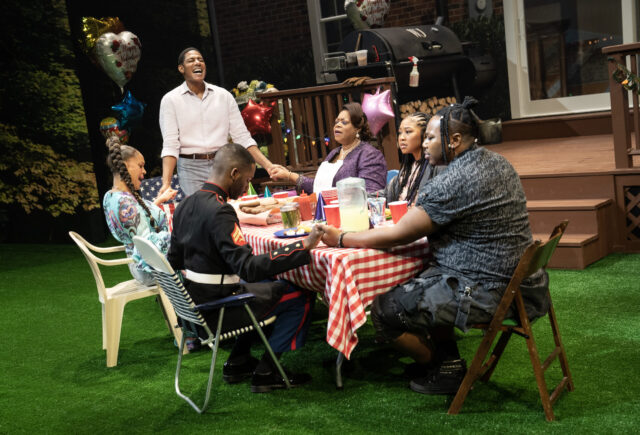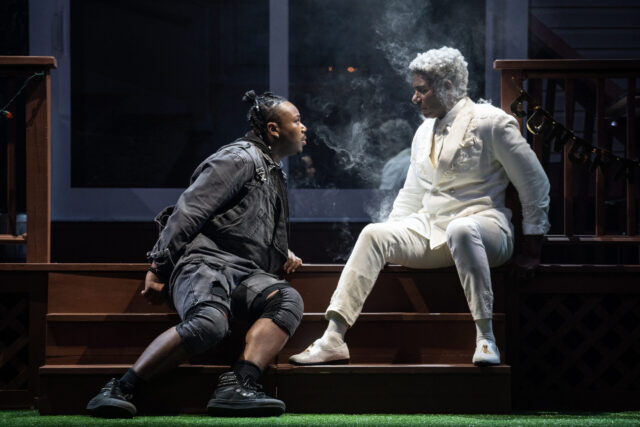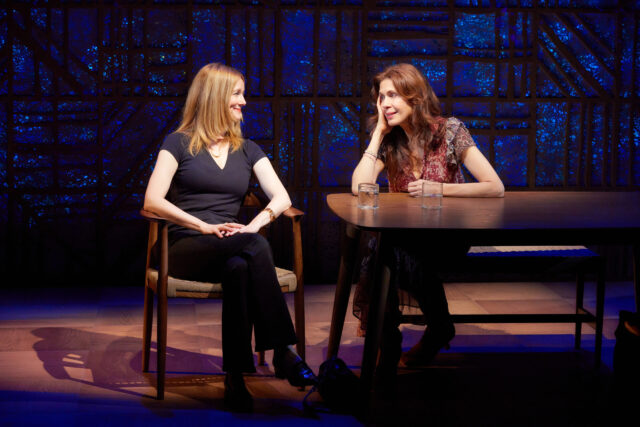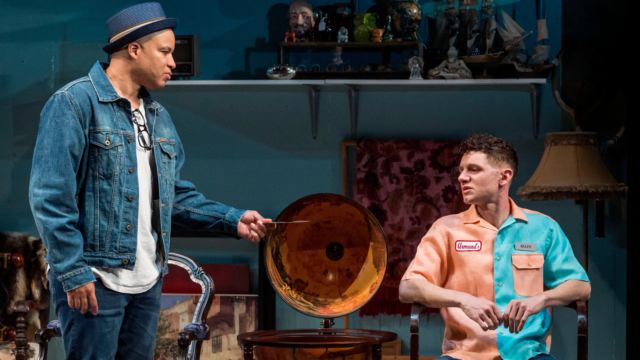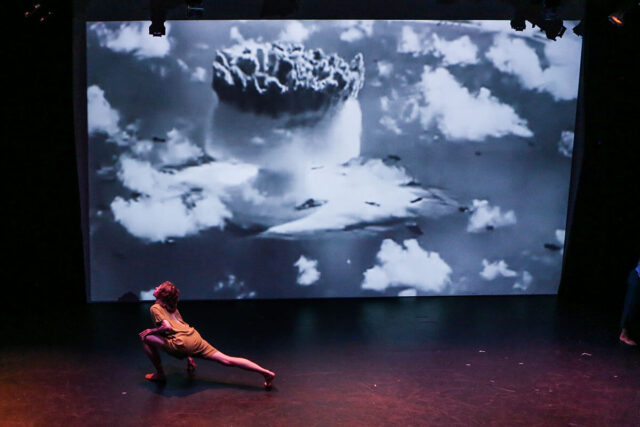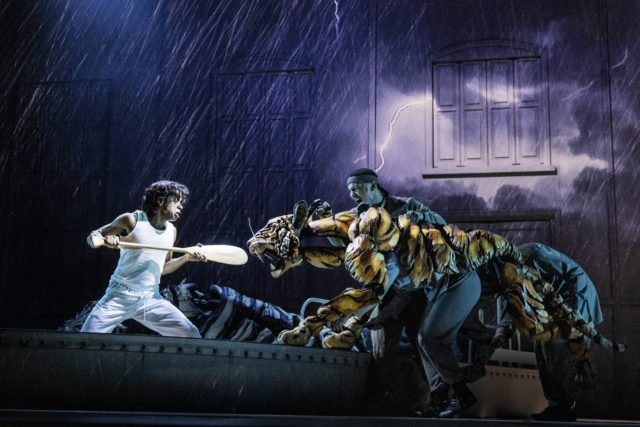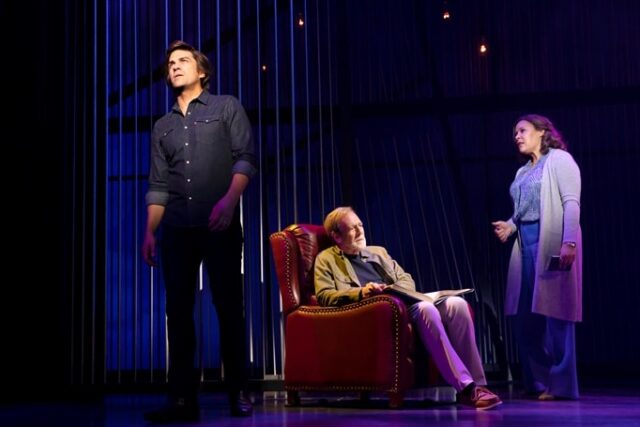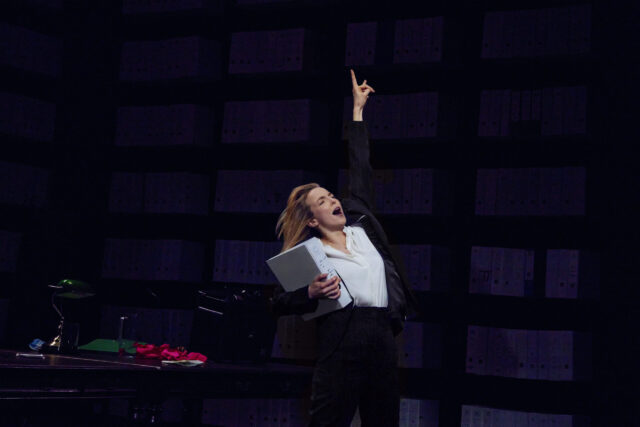
Jodie Comer makes a scintillating Broadway debut in Prima Facie (photo by Bronwen Sharp)
PRIMA FACIE
Golden Theatre
252 West Forty-Fifth St. between Broadway & Eighth Aves.
Tuesday – Sunday through July 2, $31-$335
primafacieplay.com
Jodie Comer is scintillating in her Broadway debut as a British barrister who has the tables turned on her in Suzie Miller’s Prima Facie, continuing at the Golden Theatre through July 2. In fact, it’s only the second professional stage appearance ever for the thirty-year-old Liverpool-born native, who had a supporting role in Fiona Evans’s The Price of Everything in 2010 but gained fame portraying assassin Villanelle in the television series Killing Eve.
In the Olivier-winning Prima Facie — which means “on the face of it” and is pronounced PRIME-ah FAY-see by the author, a former human rights and criminal defense lawyer herself— Comer portrays Tessa Ensler, a hotshot member of the Kings Counsel who specializes in sexual assault cases, often defending men accused of attacking women. For the first half of the ninety-minute play, she prowls across Miriam Buether’s caged set, contained within a neon frame that flashes bright light; Comer rearranges two tables and a handful of rolling chairs as she goes from law school and a courtroom to a bar, her office, her apartment, and her childhood home, where her mother and brother live. A ceiling-high bookshelf surrounds her on three sides, packed with white law journals.
In a fury of words and movement, she boasts about how the law to her is all about winning, doing whatever is necessary for her client. “It’s not emotional for me. It’s the game. The game of law,” she proclaims. She describes her cat-and-mouse legal style with relish. “There’s blood in the water and I let the witness swim on. No one can help him. And he swims right into it,” she explains. “I fire four questions like bullets. Bang. Bang. Bang bang,” she exults with glee. She makes it clear that it’s not about guilt or innocence, telling her colleagues that whether her clients did what they’re accused of or not is none of her concern. “You don’t play God, you don’t decide, or judge,” she says. Later, she explains, “The only way the system works is because we all play our roles. My role is defense, the prosecutor prosecutes; we each tell a story and the jury decide which story is the one they believe. They take the responsibility. . . . If a few guilty people get off, then it’s because the job was not done well enough by the prosecutor and the police.”
But Tessa’s world is rocked when she is sexually assaulted by her coworker Julian Brookes, a man she might have been building a relationship with and who she had previously slept with. Suddenly she is in the witness stand, being grilled by an attorney whose job it is to find holes in her story and to make it look like the act was not a crime but consensual. Even as she spots some of the same tricks she uses when she is the barrister, she realizes that the law is not necessarily about finding out what really happened. “The system I’ve dedicated my life to is called upon, by me, to find the truth. To provide justice,” she says as the prosecution starts its case.
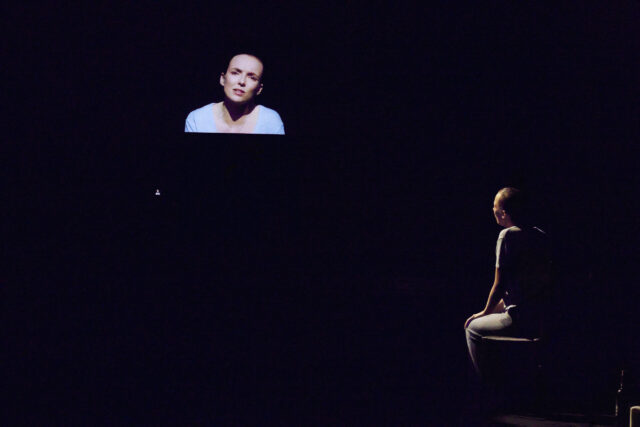
Tessa Ensler (Jodie Comer) watches herself being interviewed in play about sexual assault and the law (photo by Bronwen Sharp)
Originally presented in Australia in 2019, Prima Facie arrives in New York at a watershed moment in American history. On May 9, 2023, a jury found former president Donald Trump liable for sexual assault, battery, and defamation, ordering him to pay $5 million in damages to journalist E. Jean Carroll, who he quickly defamed again. Last month, US Supreme Court associate justice Clarence Thomas was accused of numerous financial ethics violations; his 1991 confirmation hearings were delayed when Anita Hill accused him of sexual harassment. In October 2018, Brett Kavanaugh started serving as an associate justice on the Court following a contentious confirmation hearing that focused on sexual misconduct claims made by Christine Blasey Ford.
Those episodes called into question if, when, and how women’s accusations against men should be believed, bitterly dividing the nation along political lines, with people supporting the man or the woman depending on party. Meanwhile, public confidence in the justice system has been dropping, with approval ratings for state and federal courts and the US Supreme Court all trending downward.
Prima Facie is not a comeuppance for a lawyer who suddenly finds herself a wronged survivor but a cautionary tale warning that all women are susceptible to such treatment, no matter how knowledgeable about the law and regardless of the truth itself. Miller (Sunset Strip, Caress/Ache) puts everyone on notice, showing that the legal system is no game, despite what Tessa was taught in law school and as Kings Counsel, what happens when “a woman’s experience of sexual assault does not fit the male-defined system of truth.”
The fight is relentless; there’s a reason why Miller gave Tessa the last name Ensler, after playwright and activist Eve Ensler, now known as V, who was sexually and physically abused by her father and since 2011 has led V-Day, a global organization dedicated to ending violence against all women and girls on the planet.
Director Justin Martin (The Jungle, Low Level Panic) lets Emmy winner Comer cut free in the first half of the play but slows things down once Tessa reports the crime and is questioned at the police station and later in court. Comer is a whirling dervish at the start, dancing on tables, quickly changing costumes (by Buether) from suit to robes to party outfit, and tossing her peruke (legal wig) like it’s both a charm and a burden she fully controls.
But once Tessa is raped by Julian and decides to pursue charges, Comer explores the character’s self-doubt as Tessa’s grip on the law loosens amid systemic pitfalls that make sexual assault so difficult to prove, beginning with the distrust of the survivor’s claim that it was not consensual. At one point, we observe Tessa watching a video of her interrogation by police, stunned by her lack of confidence in relating her story. “I’d only ever seen video footage of rooms like this one,” she says. “Watching a client’s interrogation while sitting with my feet on the desk in chambers. All my sass and outrage at the tricks the police play. It’s different when you’re in here.”
Natasha Chivers’s lighting illuminates the bookshelves in soft blues and glowing white before suddenly turning to complete darkness; the video design, by William Williams for Treatment Studio, features a monitor suspended from above like a ghost. Ben and Max Ringham’s effective sound highlights an underlying propulsiveness and British musician Rebecca Lucy Taylor’s (aka Self Esteem) cinematic score.
The play, which has partnered with the Schools Consent Project and other organizations, does get preachy as the conclusion approaches and doesn’t hide its point of view — the program comes with a pull-out poster that lists disturbing facts about sexual assault and proclaims, “On the Face of It, Something Has to Change” — but Comer rises above the occasional didacticism by her sheer force of will. It’s a remarkable stage debut for a vastly talented television, film, and now theater actor on the rise.
During Carroll’s civil case against Trump, she was asked why she didn’t scream when he allegedly attacked her; it became a core issue of discussion. During the trial in Prima Facie, Tessa is asked, “Did you say anything else? Scream?” It’s a chilling moment that is likely to make you want to scream yourself.

